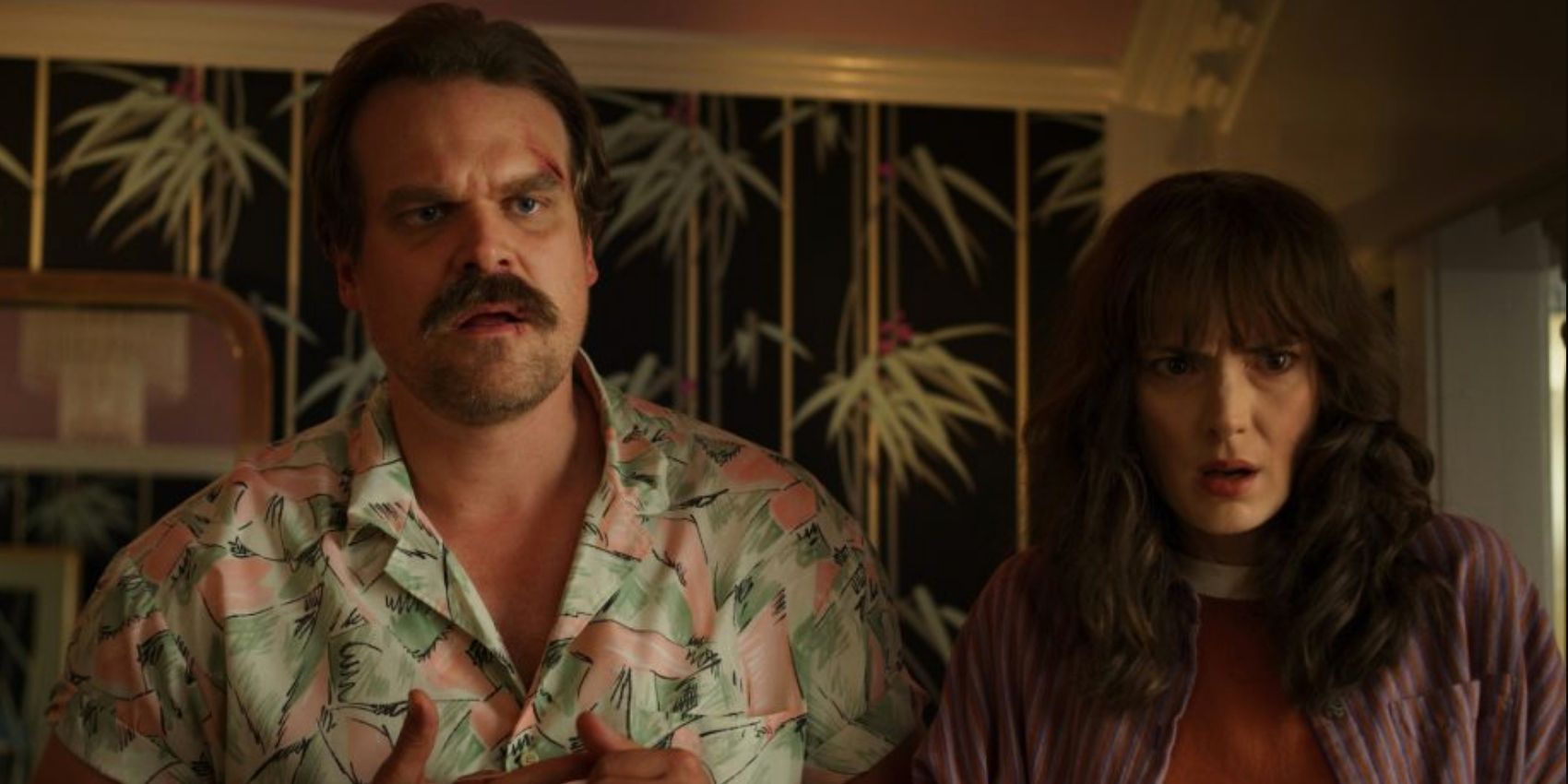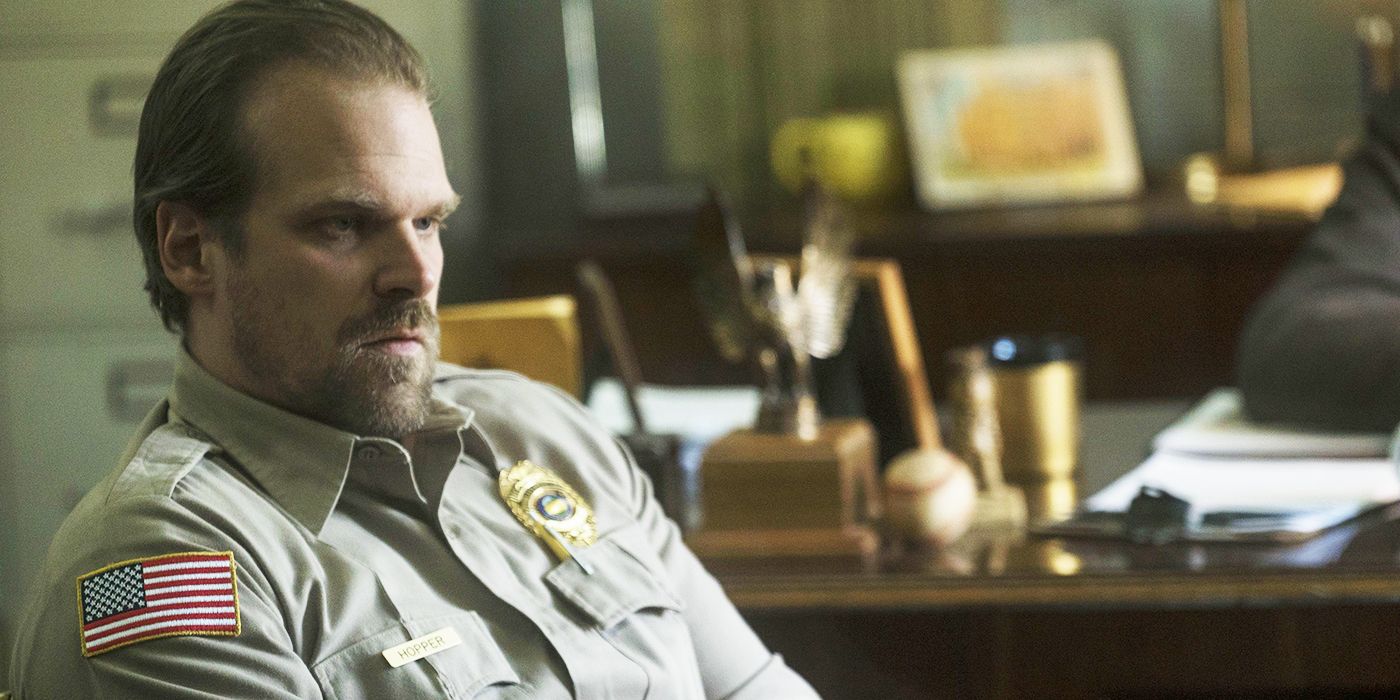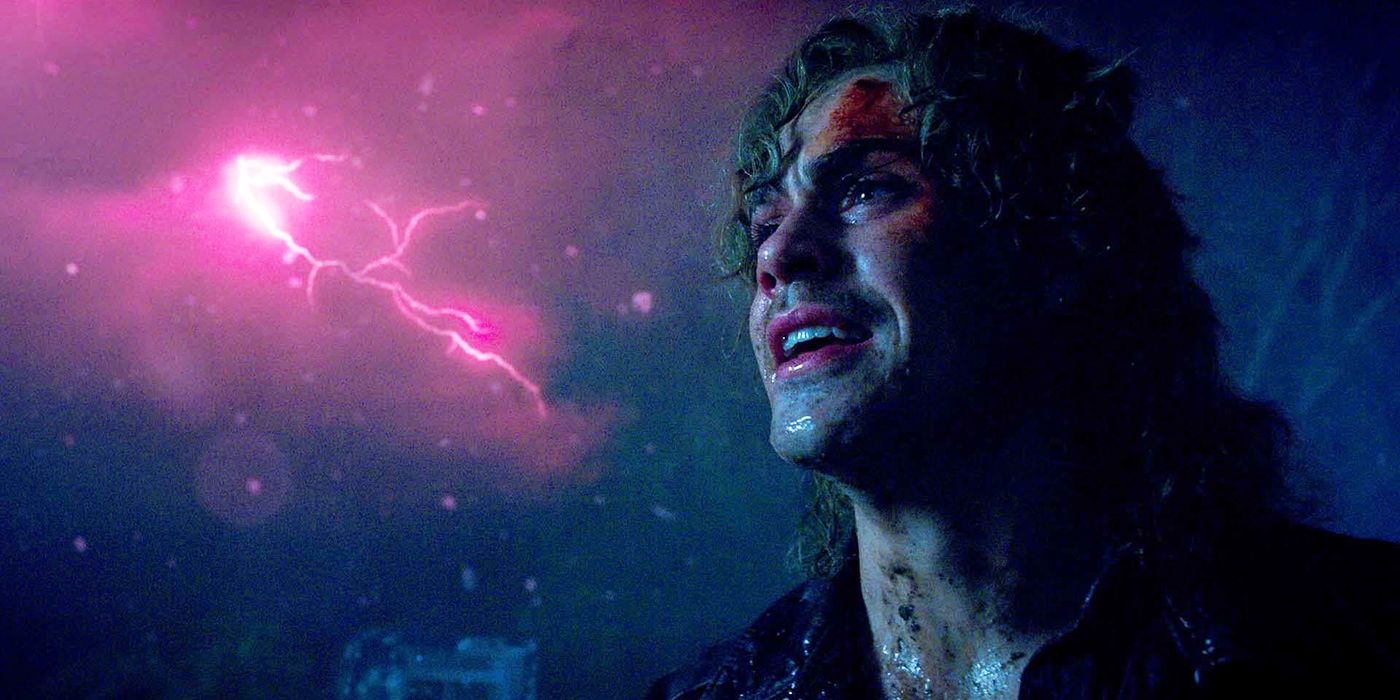The villainous Billy had a poignant redemption arc in Stranger Things' third season, but it came at the cost of the show's ostensible hero Hopper. Since the Netflix mega-hit debuted in 2016, Stranger Things has been a sci-fi TV phenomenon. Part coming-of-age nostalgia trip, part sci-fi horror, and all-around blockbuster success, the show is beloved by its huge fanbase. Each season has brought a new tone and pace to the series, and viewers are split on which is the show’s best, with some citing the first season’s somber pace or the second season’s intense action as high points.
While each season has its defenders and haters, Stranger Things season 3 was the most divisive yet, splitting fans and critics alike. Although the young cast is often singled out as the show’s strong point, it’s the show’s older male characters whose development illustrates everything that worked — and everything that didn’t — about season 3.
The show's third outing saw two of its main cast, stalwart gruff hero Hopper and newcomer bully Billy, play stereotypical tough guys, macho men who were quick to start a fight and used violence to solve every problem. This was nothing new for the volatile Jack Torrance-inspired Billy — who was established as a lethal loose cannon in the show's second season — but Hopper had until now hidden a not-so-secret heart of gold beneath his gruff, hard-drinking exterior. He was a tragic figure who grew distant after losing a child and was gradually warming to the rest of the show's cast, but there's little evidence of this stern-but-loving sweetheart in season 3's trigger-happy, threatening incarnation of the sheriff.
How Season 3 Changed Hopper
The show's main adult character after Winona Ryder's harried single mum Joyce Byers, Hopper was introduced as a troubled, taciturn detective who was harsh and clumsy when interacting with the public and wasn't above using his fists to get to the bottom of a mystery. But he was an ultimately well-meaning character, endlessly committed to fighting for what’s right and uncovering the truth, as well as saving his violent side for shadowy, murderous government agents of Hawkins Lab who were far more dangerous than him. Yet, in season 3 the character is a drunk-driving cop who abused his authority to flout the law, beating up suspects, threatening Mike (who is a snotty kid, but a kid nonetheless) instead of having a heart-to-heart with his adoptive daughter El, and even trying to force Joyce to date him.
Why Hopper's Season 3 Development Was Deeply Flawed
This belligerent machismo is new to season 3 Hopper, even prompting high-profile fan Evan Rachel Wood to publicly question whether the character shift glorified abusive behavior. At a time when police conduct has been protested the world over for some time now, there's a place for complex corrupt cops to be depicted on TV as evidenced by the likes of The Shield and The Wire. But Hopper is portrayed as an unambiguous hero, and his inability to communicate with El as well as his attempts to woo Joyce despite her obvious discomfort is played for laughs rather than anything more subversive. The shift is never explained in-story so it would be a serious stretch to claim that season 3 is attempting a deconstruction of the “cowboy cop” archetype, particularly when the season ends on his heroic (if temporary) sacrifice. Instead, the show plays into the most destructive cliches of the eighties staple, encouraging the audience to side with this unstable figure instead of questioning his conduct.
Billy's Redemptive Arc Was Done Intelligently
While Hopper’s character devolution disappointed many fans, the show offered more interesting character evolutions for its remaining male characters. Dacre Montgomery’s returning villain Billy made an immediate impression during his brutal beatdown of Steve during season 2, and the bully was an imposing presence who many fans correctly guessed the writers were setting up as main villain for season 3. What could have been a tired re-tread of Invasion of the Body Snatchers soon became the season’s most involving plotline thanks to Billy’s complex character. Like Hopper, he’s a macho man, but unlike Hopper, there’s an explanation provided for Billy’s overbearing machismo and hyper-aggression. No, it’s not the alien parasite living inside him (although that probably doesn’t help matters). The revelation that Billy had been abused by father figures throughout his upbringing gave the character a tragic backstory that made his villainous transformation both chilling and sympathetic, aided by Montgomery's stellar performance which bounced between gleeful hyper-aggression, sneering contempt, and moments of moving vulnerability.
But as proven by Steve's fledgling friendship with Robin, Billy isn't the only figure improved by softening his hard edges. It’s hard to believe that Steve, the humbled high school jock beaten up by Jonathan in season 1, would go on to become the loveable babysitter/dad of season 3. It’s down to actor Joe Keery’s affable charm that the character, originally meant to be killed off, was redeemed. Instead, season 3 sees him play both comic relief and reluctant action hero in goofy, self-deprecating style, and it’s a vital change, as Steve is a figure of fun which makes him an underdog worth rooting for, where Hopper’s fist-and-gunfighting is standard-issue indestructible heroism.
Billy's Arc Succeeded Where Stranger Things Failed Hopper
Billy is a villain imbued with poignancy and depth that the show’s earlier Demogorgons and shadowy government baddies lacked, and his overbearing tough-guy persona is shown to be both a justified front and the cause of his fatal downfall. In literal terms, it's his hyper-masculine fronting that costs him his life, since Billy falls victim to the Mind Flayer en route to seduce Karen Wheeler into a late-night extramarital rendezvous. And in more metaphorical terms it's clear that Billy's redemption comes from a moment of vulnerability. His decision to sacrifice himself and save the kids comes about after El establishes an emotional connection with him, something she never manages to do with Hopper in this season thanks to his newfound machismo attitude.
The character's last words are an apology, an admission that he's not all-powerful and should have known better. In contrast, Hopper's prescient letter to El serves as a final reminder that the audience is intended to view him as a hero, not only excusing his violent conduct and abuse of power but viewing it as necessary and in service of a greater goal. Although it's played as a redemptive moment, the fact that Hopper never actually delivered the speech but instead threatened a child is ignored, and the scene reinforces that the protagonist would have eventually gotten act together if everyone, the audience and El included, had simply been more patient and stopped criticizing his destructive and self-destructive conduct. The pushback among both fans and critics alike against Hopper’s meaner incarnation reaffirms what Billy's critically acclaimed arc and Steve’s iconic fan status proves: the strength of Stranger Things lies in subverting the tough guy archetype either comically (with Steve) or tragically (with Billy), not in playing out the tired trope.





